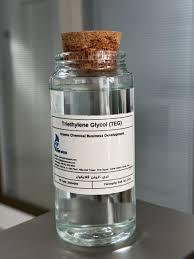
Triethylene Glycol (TEG)
Gas Dehydration & Treating: TEG is commonly used in natural gas hydration and treating applications to remove water and impurities. Triethylene glycol (TEG) has excellent hygroscopicity and low volatility. Because of these characteristics TEG is in high demand in the natural gas drying market.
CHEMICAL INTERMIDIATES: TEG is a versatile chemical intermediates used to produce a variety of products for commercial and industrial use: Adhesives and coatings, Emulsifiers, Lubricants, Plasticizers, Polyurethane foams, Solvents, Silicone compounds, Thermoplastics Unsaturated polyester resins.
Heat Transfer Fluid: Triethylene glycol (TEG) due to its low freezing point, freezing point depressant and high boiling point is predominantly used in heat transfer fluids.
SOLVENTS: Triethylene glycols (TEG) have excellent solvent properties. TEG is used as solvents in several applications: Aromatic and paraffinic hydrocarbons separations, Cleaning compounds, Cyanoacrylate and polyacrylonitrile, Polyethylene terephthalate (PET) production equipment cleaning, Steam-set printing inks.
OTHER APPLICATIONS: Triethylene glycol (TEG) may be used directly as a plasticizer or modified by esterification. As a plasticizer, TEG is used in the manufacture of:
- Safety glass
- Separation membranes (silicone rubber, polyvinyl acetate, cellulose triacetate)
- Ceramic materials (resistant refractory plastics, molded ceramics)
Products List
-
Cosmetic Chemicals10
- Cosmetic Chemicals
- Tweens / Polysorbate
- Ammonium Lauryl Sulphate
- Barium Sulphide
- Lanolin Anhydrous
- MPP
- MPS
- Potassium Hydroxide
- PPS
- Pumice Stone Powder
- Resorcinol
- Salycilic Acid
- Salycilic Acid
- Scrub Powders
- Sodium Hydroxide
- Sodium Lauryl Sulphate
- Spans & PEG
- Stearic Acid
- Steryl Alcohol
- Superamide
- Talc Powder
- Thioglycolic Acid
-
Inorganic Chemicals10
-
Chemical Solvents12
-
Chemicals For Processing Industries10
-
Food Processing Chemicals10
- Food Processing Chemicals
- Sodium Benzoate
- Citric Acid
- Benzoic Acid
- Sodium Perborate
- Xanthan Gum
- Arabic Gum
- Guar Gum
- Karaya Gum
- Ester Gum
- Caraganan Gum
- Maleic Acid
- Acid Tartaric
- Sodium Bi-Carbonate
- Acetic Acid
- Hydrogen Per Oxide
- Pepsin
- Papain
- Agar Agar
- Titanium Dioxide
- Ascorbic Acid
- Aspartame
- BHA
- BHT
- Boric Acid & Borax
- Caramel
- Butyric Acid
- Cocoa Butter
- Castor Oil
- Egg Powder
- Dried Powders Of All Spices
- Food Grade Essences
- Filter Aids
- Formaldehyde
- Lactic Acid
- Magnesium Carbonate
- Paraffin Oils
- Phosphoric Acid
- Sodium Meta Bi Sulphite
- Soya Lecithin
- Starches
- Glycerine
- GMS
- EGMS
- TBHQ & China Grass
-
Glycerol Triacetin13
-
Laboratory & Testing Chemicals10
-
Silver-Dip Solution For Silver Polish10
-
Metallic Salts & Minerals10
-
Metallic Salts & Minerals10
-
Menthol & Derivatives10
-
Herbal Henna10
-
Aloe Vera Extracts10
-
Herbal Products10
-
Laboratory Chemicals10
-
Leather Processing Chemicals10
-
Metallic Minerals10
-
Organic Solvents10
-
Testing Chemicals10
-
Triacetin10
-
Textile Chemicals10
-
Printing Ink Chemicals10
-
Metallic Salts10
-
Menthol Derivatives10
-
Menthol & Crystals10
-
Lawsonia Inermis10
-
Inorganic Solvents10